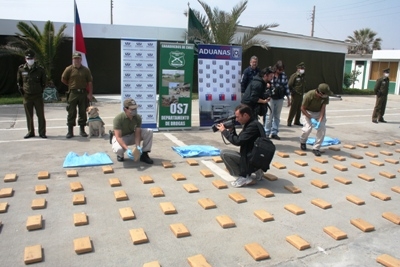Four national police officers from Chile have been detained for involvement in smuggling over a ton of marijuana from Bolivia to Chile, underlining how major corruption pervades even the most trusted of Latin America’s security forces.
Four ranking officers of the Carabineros — Chile’s national police — and two other citizens, whose nationality was identified in reports, were arrested for allegedly facilitating at least two drug shipments from Bolivia into the northern Chilean province of Arica, near the border with Peru, reported La Tercera.
Among those arrested was the chief of the Carabineros anti-drug force in Arica, as well as a captain and two sergeants, reported La Razon. The shipments were seized on August 5 and September 9, and totaled approximately 1.1 tons of marijuana, according to La Prensa.
According to Chilean regional District Attorney Javiera Lopez, the officers were responsible for the entire operation, organizing the purchase and transportation of the consignments.
InSight Crime Analysis
Chile has historically been one of the countries least impacted by drug trafficking in Latin America: it has the region’s lowest murder rate and is considered one of the least corrupt nations, with the highest ranking (20th globally, tied with Uruguay) of any Latin American nation on Transparency International’s Corruption Perceptions Index.
However, it has not been immune to the drug trade. It is the site of substantial money laundering operations and, thanks to its shared borders with Peru and Bolivia, operates as a transshipment point. Over the last two years there have indications that drug trafficking into Chile is increasing, and the drug trade has seemingly moved closer — underlined by the October discovery of a drug-producing “narco-village” near the Chile-Bolivia border. In May, Bolivian officials claimed Chile had become the primary destination for Bolivian drug trafficking “mules,” surpassing both Argentina and Brazil.
SEE ALSO: Coverage of Chile
This growth is likely not only fuelled by use of Chile as an international drug dispatch point but also by the domestic market. According to the Organization of American States’ 2011 Report on Drug Use in the Americas, the Chilean population has a higher prevalence of cocaine use than major consumer countries Argentina and Brazil.
Under these conditions, while the arrests of the Carabineros remains unusual, such cases may become a more common occurrence in the future.

